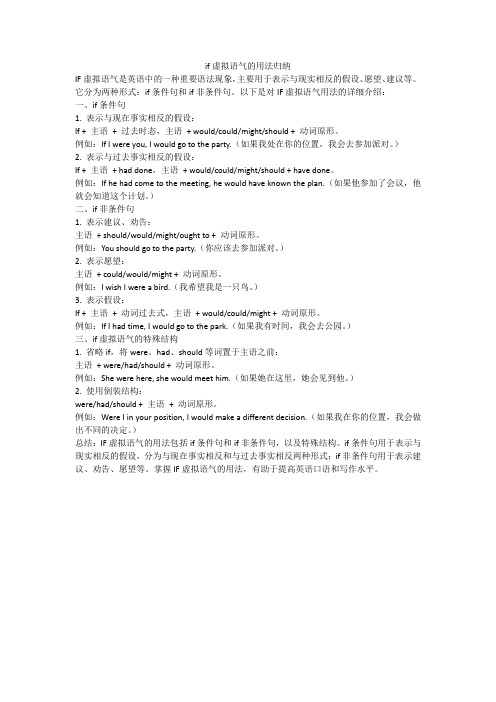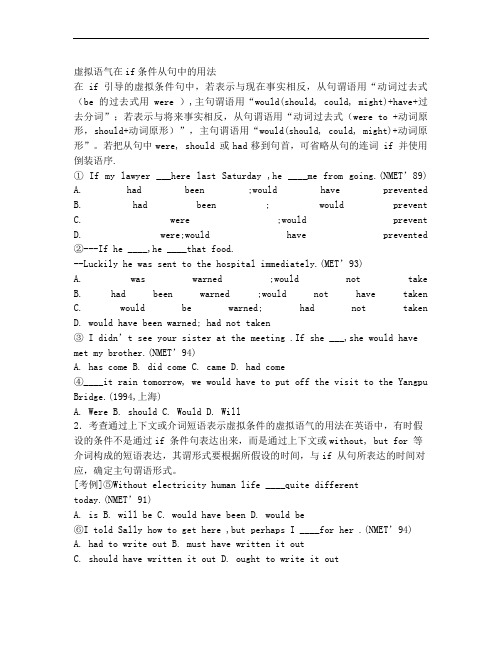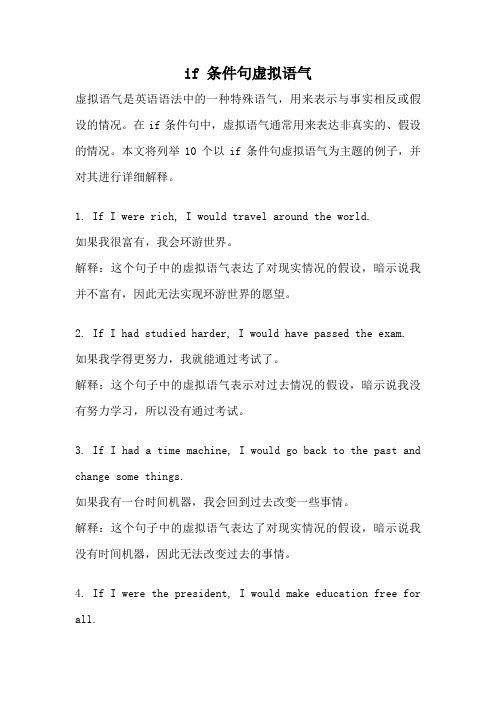公开课-虚拟语气在if条件句中的用法
- 格式:ppt
- 大小:1.45 MB
- 文档页数:7


if虚拟语气的用法归纳IF虚拟语气是英语中的一种重要语法现象,主要用于表示与现实相反的假设、愿望、建议等。
它分为两种形式:if条件句和if非条件句。
以下是对IF虚拟语气用法的详细介绍:一、if条件句1. 表示与现在事实相反的假设:If + 主语+ 过去时态,主语+ would/could/might/should + 动词原形。
例如:If I were you, I would go to the party.(如果我处在你的位置,我会去参加派对。
)2. 表示与过去事实相反的假设:If + 主语+ had done,主语+ would/could/might/should + have done。
例如:If he had come to the meeting, he would have known the plan.(如果他参加了会议,他就会知道这个计划。
)二、if非条件句1. 表示建议、劝告:主语+ should/would/might/ought to + 动词原形。
例如:You should go to the party.(你应该去参加派对。
)2. 表示愿望:主语+ could/would/might + 动词原形。
例如:I wish I were a bird.(我希望我是一只鸟。
)3. 表示假设:If + 主语+ 动词过去式,主语+ would/could/might + 动词原形。
例如:If I had time, I would go to the park.(如果我有时间,我会去公园。
)三、if虚拟语气的特殊结构1. 省略if,将were、had、should等词置于主语之前:主语+ were/had/should + 动词原形。
例如:She were here, she would meet him.(如果她在这里,她会见到他。
)2. 使用倒装结构:were/had/should + 主语+ 动词原形。

虚拟语气在if条件从句中的用法在if 引导的虚拟条件句中,若表示与现在事实相反,从句谓语用“动词过去式(be 的过去式用were ),主句谓语用“would(should, could, might)+have+过去分词”;若表示与将来事实相反,从句谓语用“动词过去式(were to +动词原形,should+动词原形)”,主句谓语用“would(should, could, might)+动词原形”。
若把从句中were, should 或had移到句首,可省略从句的连词 if 并使用倒装语序.① If my lawyer ___here last Saturday ,he ____me from going.(NMET’89)A. had been ;would have preventedB. had been ; would preventC. were ;would preventD. were;would have prevented②---If he ____,he ____that food.--Luckily he was sent to the hospital imme diately.(MET’93)A. was warned ;would not takeB. had been warned ;would not have takenC. would be warned; had not takenD. would have been warned; had not taken③I didn’t see your sister at the meeting .If she ___,she would have met my brother.(NMET’94)A. has comeB. did comeC. cameD. had come④____it rain tomorrow, we would have to put off the visit to the Yangpu Bridge.(1994,上海)A. WereB. shouldC. WouldD. Will2.考查通过上下文或介词短语表示虚拟条件的虚拟语气的用法在英语中,有时假设的条件不是通过if 条件句表达出来,而是通过上下文或without, but for 等介词构成的短语表达,其谓形式要根据所假设的时间,与if 从句所表达的时间对应,确定主句谓语形式。

if 条件句虚拟语气虚拟语气是英语语法中的一种特殊语气,用来表示与事实相反或假设的情况。
在if条件句中,虚拟语气通常用来表达非真实的、假设的情况。
本文将列举10个以if条件句虚拟语气为主题的例子,并对其进行详细解释。
1. If I were rich, I would travel around the world.如果我很富有,我会环游世界。
解释:这个句子中的虚拟语气表达了对现实情况的假设,暗示说我并不富有,因此无法实现环游世界的愿望。
2. If I had studied harder, I would have passed the exam.如果我学得更努力,我就能通过考试了。
解释:这个句子中的虚拟语气表示对过去情况的假设,暗示说我没有努力学习,所以没有通过考试。
3. If I had a time machine, I would go back to the past and change some things.如果我有一台时间机器,我会回到过去改变一些事情。
解释:这个句子中的虚拟语气表达了对现实情况的假设,暗示说我没有时间机器,因此无法改变过去的事情。
4. If I were the president, I would make education free for all.如果我是总统,我会让教育对所有人免费。
解释:这个句子中的虚拟语气表达了对现实情况的假设,暗示说我并不是总统,所以无法实现让教育免费的目标。
5. If it didn't rain tomorrow, we could go hiking.如果明天不下雨,我们可以去远足。
解释:这个句子中的虚拟语气表达了对未来情况的假设,暗示说明天可能会下雨,所以无法去远足。
6. If I had known you were coming, I would have prepared a meal for you.如果我知道你要来,我会为你准备一顿饭。

虚拟语气:表示动作或状态不是客观存在的事实,而是说话人的主观愿望、假设或推测等。
If I were a bird, I could fly in the air. 如果我是一只小鸟,我就能在空中飞行。
I wish I could pass the examination. 我希望我能通过考试。
May you succeed! 祝您成功!I.状语从句中的虚拟语气一、虚拟语气在if 引导的条件句中的用法:1. 表示与现在事实相反的虚拟条件句。
其句子结构为:从句:If + 主语+ 动词的过去式(be 用were) + ……主句:主语+ would (should, could , might) + 动词原形+ ……If I were you, I would go with him. If the weather were fine, I would go there.If it weren’t snowing, we wouldn’t stay in the house.If it weren’t for your help, we would get into trouble.If they were here, he would be speaking to them now.2. 表示与过去事实相反的虚拟条件句。
其句子结构为:从句:If + 主语+ had +动词的过去分词+ ……主句:主语+ would (should, could, might) + have +动词的过去分词+……If you had taken my advice, you would not have made such a mistake.如果你听了我的劝告,就不会犯这样的错误。
If it hadn’t been for your help, I shouldn’t have finished this work on time.要是没有你们的帮忙,我就不会按时完成了这项工作。

if引导的条件句中的虚拟语气虚拟语气表示一种不能实现的假设。
该语法主要用于if条件状语从句。
一、if引导的条件状语从句的分类及虚拟条件句的判断1、可以把条件句分为两类:1).真实条件句(Sentences of Real Condition):凡是假设的情况发生性可能很大,就是真实条件句。
例如:⑴、If I have tim e , I will help you with this work.如果我有时间会帮助你做此工作的。
(2)、If time permits, we'll go fishing together.(如果有时间的话,我们就一起去钓鱼。
)2).虚拟条件句(Sentences of Unreal Condition):当假设是不大可能实现时,就是虚拟条件句。
例如:⑴、If I were you , I w ould have attended the meeting. 如果我是你的话,就去参加会议了。
⑵、If he had come here yesterday, he would have seen his old friend.假如他昨天来这儿的话,就会看见他的老朋友。
⑴、If it had rained yesterday, we would have stayed at home.(如果昨天下雨的话,我们就会留在家里。
)2、.if条件状语从句中虚拟语气的判断判断是真实条件句还是非真实条件句。
只有在非真实条件句中才使用虚拟语气。
通过句子意思,看假设的条件是否能够实现,能够实现是真实条件句,不能使用虚拟语气;假设的条件不能实现则是非真实条件句,要用虚拟语气。
判断这个假设是与哪个事实相反。
通常有三种情况:①与过去事实相反。
②与现在事实相反。
③与将来事实可能相反。
3、“后退一步法”后退一步法是指在准确地判断了该句与哪一事实相反后,按虚拟语气的后退一步法处理从句谓语动词的时态。
If虚拟语气在if引导的条件句中的用法三点:从句(条件)主句(目的)例句表示于现在事实相反的虚拟条件句If+主语+动词的过去式(be用were)主语+would(shouldcould might)+动词原型If he were free, he would help us. 要是他有空的话,它会帮助我们的。
表示与过去事实相反的拟条件句If+主语+had+动词的过去分词主语+would(shouldcould might)+have+动词的过去分词If I had seen the film, I would havetold you about it. 我如果看过这场电影,我会把电影内容告诉你了。
表示与将来事实相反的虚拟条件句If+主语+should(wereto)+动词原型/动词的过去式主语+would(couldshould might)+动词原型If he were to come here, he wouldtell us about it. 如果他要来的话,他会通知我们一声引导真实条件状语从句引导真实条件状语从句(虚拟语气)与将来事实相反的虚拟语气请看下面的题目:If we __________ 200 years old,we __________ everything.A. were to be,could changeB. had been,changedC. were,would have changedD. should be,changed该题考查与将来事实相反的虚拟语气,此时的主句谓语通常用would(should,could,might)+动词原形,而从句谓语可能有以下几种情况:1.从句谓语用过去式:If your father knew this,he would be angry. 要是你父亲知道了,他会生气的。
If it rained tomorrow,the sports meet would be put off. 要是明天下雨,运动会就推迟。
有关英语if条件句虚拟语气用法
if的虚拟语气用法:
1、现在时:当if引导的虚拟语气表示与现在事实相反时,主句谓语用could、would、shoul d或mi ght加动词原形,条件从句中的谓语用过去式。
2、过去时:当if引导的虚拟语气表示与过去事实相反时,主句谓语用could、would、shoul d或mi ght加have再加动词原形,
3、将来时:当if引导的虚拟语气表示与将来事实相反时,主句谓语用could、would、shoul d或mi ght加动词原形,条件从句中的谓语用过去式。
虚拟语气中,表条件的状语从句的if可以省略,但主语必须与动词易位(也就是倒装):
If it were not for his illness, he could do better.
=Were it not for his illness, he could do better.
如果不是因为他生病,他可以做得更好。
If he had money, he would buy that villa.
= Had he money, he would buy that villa.
对将来情况的虚拟:
主句:主语+would/should/might/could+动词原形从句:should+动词原形/were to+动词原形。
对现在情况的虚拟:
主句:主语+would/should/might/could+动词原形从句:动词过去式
对过去情况的虚拟:
主句:主语+would/should/might/could have+动词过去分词从句:had+动词过去分词。